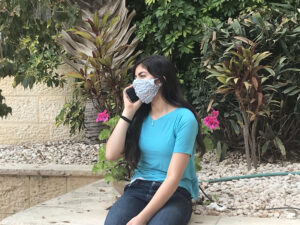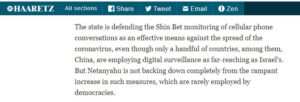- 270
- 271SHARES
May 6 UPDATE:
Haaretz Corrects in English, Hebrew
In response to communication from CAMERA, Haaretz corrected both its English and Hebrew reports. See below for a detailed update.
The state is defending the Shin Bet monitoring of cellular phone conversations as an effective means against the spread of the coronavirus . . .

A resident of Modiin, central Israel, with her cellphone amid the coronavirus pandemic (Photo by Tamar Sternthal)
The police will be able to collect the data on the location of the person under surveillance and to send it to the Health Ministry. For the purpose of enforcing the quarantines, the data on an individual’s location will be collected as a sample, which is not prolonged or consecutive. This refers to the person’s last location.
The Shin Bet will be able to access all the information from the cellphone, with the exception of the content of the conversations and messages, which is considered wiretapping and requires a specific court order. [Emphasis added.]
Dr. Tehilla Schwartz Altshuler of the Israel Democracy Institute said that the Shin Bet will also be able to access the credit history saved on the device. The objective is to find the people who were in the surrounding area of people who are ill or suspected of being ill. Attorney General Avichai Mendelblit said on Tuesday that the Shin Bet will not collect the content of citizens’ messages and emails.
How does the tracking work?
The law already allows law enforcement authorities to receive the location of a cellphone by requesting it from a cellphone company. The data is not precise, but makes it possible to get a radius of dozens or hundreds of meters, by means of the antenna that received the signals from the device. According to the law currently, a police officer with the rank of chief superintendent or above can ask the Magistrate’s Court for permission to conduct tracking in order to investigate or prevent crimes.
In effect, the new regulation makes it unnecessary to receive permission from a judge. The signals that are collected are cellular, rather than being connected to the GPS component of smartphones, and are used for apps based on location. Therefore turning off the device or the location app won’t help to remove the tracking - the only way to avoid cellular surveillance is not to walk around with a cellphone.
 The Hebrew edition's version of Amos Harel's same article somewhat more accurately states that Shin Bet's monitoring entails the location of conversations. But this too is not entirely precise, as the Shin Bet can still collect the location data even when the phone is not in use, according to Haaretz's earlier report.
The Hebrew edition's version of Amos Harel's same article somewhat more accurately states that Shin Bet's monitoring entails the location of conversations. But this too is not entirely precise, as the Shin Bet can still collect the location data even when the phone is not in use, according to Haaretz's earlier report.May 6 Update: Haaretz Corrects in English, Hebrew
In response to CAMERA's communication with editors, Haaretz yesterday commendably corrected the digital articles both in English and Hebrew. The online article now accurately refers to the tracking of phone locations, as opposed to the monitoring of conversations :
The state is defending the Shin Bet monitoring of cellular phone location as an effective means against the spread of the coronavirus…
The Hebrew online article also no longer misleadingly refers to the Shin Bet's location of conversations, and now accurately refers to the location of cell phones. Contrary to standard journalistic practice, however, a correction noting the change is not appended to the articles. Nor have the errors been corrected in the print edition.
